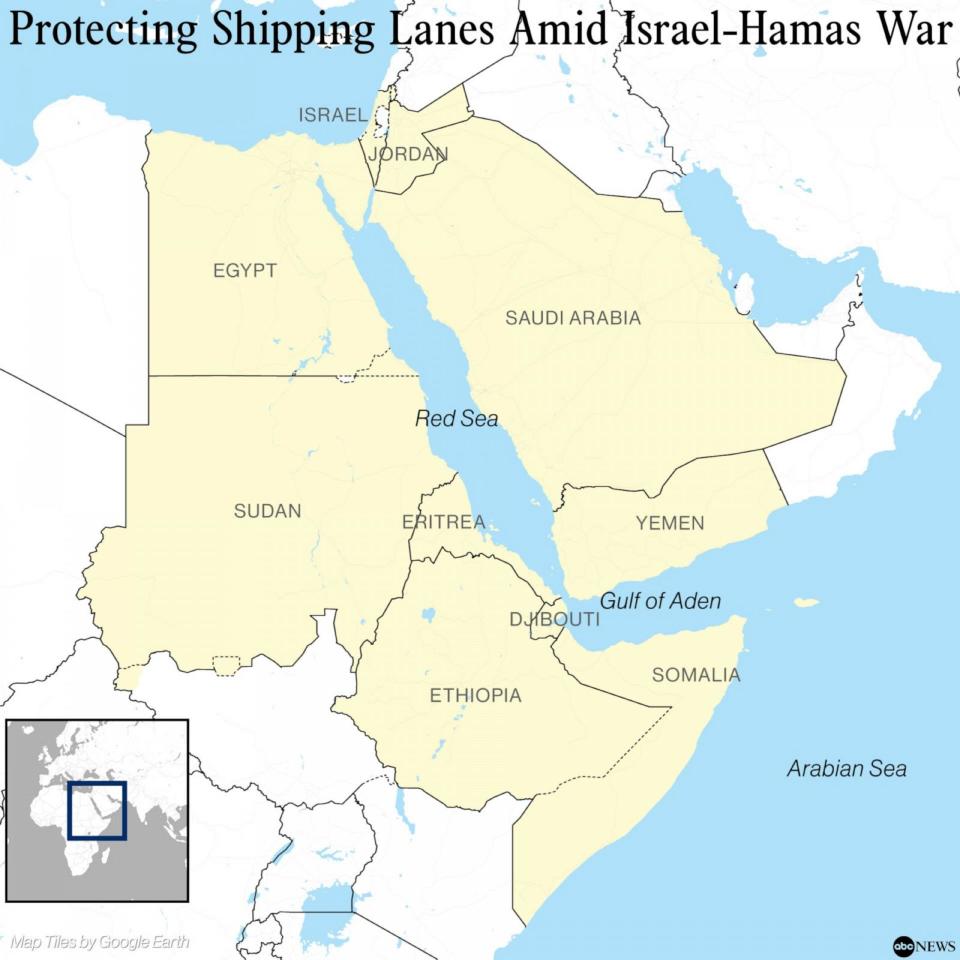How the US is protecting Red Sea shipping lanes as Israel-Hamas war continues: ANALYSIS
The Red Sea is one of the busiest, most dangerous shipping lanes in the world, close to the Gulf of Aden off Yemen, which is known as one of the most "pirate-infested" waters.
Given the oil exports from the area, coupled with access to the Mediterranean Sea, Africa and Asia, its strategic location brings threats by criminals, as well as illicit nation-state actors that endanger worldwide shipping. These threats have only been magnified by the Israel-Hamas war, as Houthi rebels based in Yemen have increased attacks during this time.
Three commercial ships came under attack in the international waters of the Red Sea on Sunday, U.S. military officials said, as Iran-backed Houthi militants claimed responsibility for the latest escalation in the Middle East.
MORE: US considering 'appropriate action' in response to Houthi missile attacks in Red Sea

The USS Carney, a U.S. Navy destroyer that has been patrolling in the area, intercepted and shot down three drones while assisting the vessels, the United States Central Command (CENTCOM) said.
White House national security adviser Jake Sullivan on Monday continued to place blame for the Houthi attacks squarely on Iran, saying the country is supplying the Houthis with the weapons being used. He also said the commercial ships that were targeted had ties to 14 different countries and showed the extent of a "source of global concern and a threat to international peace and stability."
This was the latest in a series of worrisome incidents against U.S. Navy ships in the Red Sea area as the Israel-Hamas war continues.
Merchant ships have been targeted in the region for decades. Since much of the world's economy depends on oil from that region, the U.S. Navy has, at times, been called upon to protect commercial vessels transiting the region as part of its mission.
Ships in the region have faced a rise in piracy and other attacks over the last few months. Due to this increased threat, the U.S. Navy escalated its presence in the region, which it had done only twice before.
For the third time in over two decades, two aircraft carrier strike groups comprising 10 ships, 130 aircraft and 9,000 personnel are operating in the waters close to the Middle East -- in the Eastern Mediterranean, Red Sea and Persian Gulf areas, according to the Navy.
The U.S. Navy has been in the region for decades, but the Navy and Coast Guard's mission to protect shipping lanes and international commerce, in light of the described threats, is a relatively recent one.
MORE: US moves carrier to Middle East following attacks on US forces
The U.S. Naval Forces Central Command created the Combined Maritime Forces (CMF) unit, which is part of a multi-national naval partnership. This partnership "exists to promote security, stability and prosperity across approximately 3.2 million square miles of international waters, which encompass some of the world's most important shipping lanes," the CMS says, including the Red Sea, Gulf of Aden and Persian Gulf -- all of which comprise the doorway into the Eastern Mediterranean.
The U.S. Coast Guard has also been deployed to the region, for over two decades, in Patrol Forces Southwest Asia and works with the Navy to provide security to the Naval facility in Bahrain, Naval ships and commercial vessels transiting the area, especially from Iranian harassment. One such incident occurred on May 10, 2021, when the USCGC Maui, a Coast Guard cutter, fired 30 warning shots after 13 Islamic Revolutionary Guard Corps Navy fast boats came within 150 yards of six U.S. military vessels, which were escorting the guided-missile submarine Georgia.
This strategic location -- and the threats emanating from the region via Iran, piracy off the coast of Somalia, rebel factions in Yemen and other nefarious actors -- could threaten some of the most important shipping lanes in the world, and it's up to the U.S. Navy and Coast Guard to keep them safe.
Donald J. Mihalek is an ABC News contributor, retired senior Secret Service agent and regional field training instructor who served during two presidential transitions. He was also a police officer and served in the U.S. Coast Guard.
How the US is protecting Red Sea shipping lanes as Israel-Hamas war continues: ANALYSIS originally appeared on abcnews.go.com

